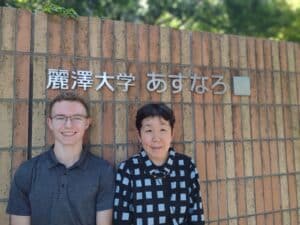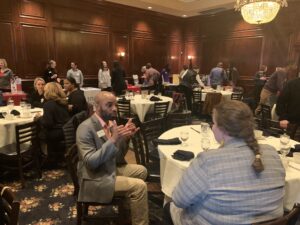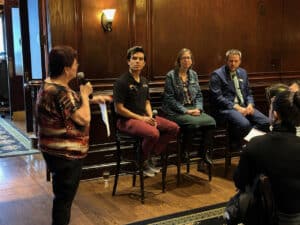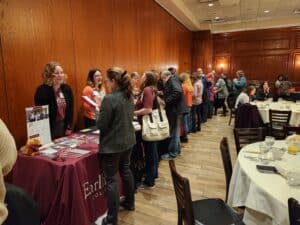Six institutions within the Great Lakes College Association have inked a partnership with the company Possible to launch an experiential learning program designed to help students learn about, identify, and attain a career in the tech industry that aligns with their goals.
Ann Arbor, November 13, 2023 — Kenyon College, Wabash College, Oberlin College, Denison University, Allegheny College, and Earlham College have announced a new collaborative program designed to help students explore multiple disciplines in the tech industry, from marketing to operations to product management, all taught by professionals in those careers.
Possible, a career exploration company, will partner with the six participating institutions in crafting a program that supplements the job resources provided by their career centers. With a scaffolded curriculum on in-demand career paths, the interactive program has students interact with industry professionals every weekday for five weeks. Students’ career education will occur through a mix of intimate networking sessions, hands-on projects, workshops, panels, and events.
Uniquely, the sessions are all taught by top working industry professionals via 100% live, virtual instruction. Students will be learning from recruiters, hiring managers, founders, and individual contributors from companies such as Microsoft, Meta, Square, Etsy, and Modern Treasury. The Possible program will be launching in the summer of 2024.
“Preparing our students for a successful career launch is an essential part of what all our GLCA institutions do,” said Mickey McDonald, President of GLCA. “This collaboration to create a cohort of 50 student participants across several of our institutions is a prime example of how a consortium can support the success of our members and their students.”
“It is an honor for us to be able to partner with these 6 prestigious liberal arts institutions,” said David Chase, CEO of Possible. “Not only will their students get an opportunity to network and gain insight from top industry professionals, but they will also be networking with peers at other GLCA schools. “It is an honor for us to be able to partner with these 6 prestigious liberal arts institutions,” said David Chase, CEO of Possible. “Not only will their students get an opportunity to network and gain insight from top industry professionals, but they will also be networking with peers at other GLCA schools. “It is an honor for us to be able to partner with these 6 prestigious liberal arts institutions,” said David Chase, CEO of Possible. “Not only will their students get an opportunity to network and gain insight from top industry professionals, but they will also be networking with peers at other GLCA schools. I see this cross-institution partnership as a great example of the way that associations can support their institutions and set students up for long-term success in the job market and their careers.”
About the Great Lakes College Association
Founded in 1962, the Great Lakes Colleges Association (GLCA) is a consortium of thirteen selective liberal arts institutions in the Midwest: Albion, Allegheny, Antioch, Denison, DePauw, Earlham, Hope, Kalamazoo, Kenyon, Oberlin, Ohio Wesleyan, Wabash, and Wooster. Throughout its history, the GLCA has acted to strengthen member institutions and exemplify the power of education in the tradition of the liberal arts. For more information see www.glca.org.
About Possible
Possible helps students bridge the gap between university and the workforce through experiential learning programs that educate them about core career paths in technology. Possible is part career education, part networking, and part career prep, and graduates see dramatic growth in career confidence, role clarity, and their professional networks. 98% of program graduates believe that Possible is a signature experience of their time in college. Students have landed job offers at companies like Amazon, Google, Oracle, J&J, and Grammarly. For more information, visit www.heypossible.com.







 Donn Charles Neal, age 82, formerly of Pittsburgh, passed away on August 6, 2023. Son of Charles and Irene Neal of Michigan, he was preceded in death by his beloved wife of 52 years Peggy and is survived by sons David (Stephanie) and Peter (Allison) and two granddaughters, Quincy and Piper.
Donn Charles Neal, age 82, formerly of Pittsburgh, passed away on August 6, 2023. Son of Charles and Irene Neal of Michigan, he was preceded in death by his beloved wife of 52 years Peggy and is survived by sons David (Stephanie) and Peter (Allison) and two granddaughters, Quincy and Piper. Donn authored “The World Beyond the Hudson: Alfred E. Smith and National Politics 1918-1928” and edited “Consortia and Inter-Institutional Cooperation,” as well as creating an extensive family history which appears on his website.
Donn authored “The World Beyond the Hudson: Alfred E. Smith and National Politics 1918-1928” and edited “Consortia and Inter-Institutional Cooperation,” as well as creating an extensive family history which appears on his website. At each of the two February events, held in Chicago and nearby Schaumburg, counselors gathered for breakfast and informal conversation with admissions officers from among the 27 collective small liberal arts colleges of the GLCA and ACM. Each day, two panels of professional admission and financial aid staff from the consortia spoke on general admissions topics and financial aid. Each event concluded with a college fair providing one-on-one conversations between high school counselors and admission staff.
At each of the two February events, held in Chicago and nearby Schaumburg, counselors gathered for breakfast and informal conversation with admissions officers from among the 27 collective small liberal arts colleges of the GLCA and ACM. Each day, two panels of professional admission and financial aid staff from the consortia spoke on general admissions topics and financial aid. Each event concluded with a college fair providing one-on-one conversations between high school counselors and admission staff. The panels covered pertinent topics including the benefits of attending a small residential liberal arts college, such as the individual attention students receive, a topic of particular importance as mental health concerns have risen on campuses following COVID-19.
The panels covered pertinent topics including the benefits of attending a small residential liberal arts college, such as the individual attention students receive, a topic of particular importance as mental health concerns have risen on campuses following COVID-19. “After a successful pivot to virtual activities during the pandemic, these breakfasts were the Midwest College Showcase’s first foray back into in-person gatherings. We tailored the program to cover topics that were of most interest to counselors and their students, and we are thrilled that so many counselors joined us. We will be adding more information on the topics covered to the Midwest College Showcase
“After a successful pivot to virtual activities during the pandemic, these breakfasts were the Midwest College Showcase’s first foray back into in-person gatherings. We tailored the program to cover topics that were of most interest to counselors and their students, and we are thrilled that so many counselors joined us. We will be adding more information on the topics covered to the Midwest College Showcase